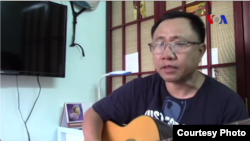A blogger jailed after filming protests over a toxic spill has gone on a hunger strike over unjust treatment in Vietnam’s An Diem prison, alongside two other prisoners of conscience.
Nguyen Van Hoa, 25, a blogger and contributor to Radio Free Asia (RFA) Vietnam Service, is protesting prison conditions with human rights defender Nguyen Bac Truyen and blogger and activist Pham Van Diep.
In a call to his home, Truyen said he began his hunger strike in November and would continue until prison conditions and treatment improved, his wife, Bui Thi Kim Phuong, told VOA Vietnamese on November 28.
“He told me the reasons for the hunger strike were unjust treatments by the prison officials. They have protested about lack of access to medical care and confiscation of letters from prisoners to their families without explanation,” Phuong said.
Truyen tried to send two letters home in April, but prison authorities blocked them, Phuong said, without detailing the content of the letters.
In 2019, Truyen filed a request to prison authorities in An Diem, which falls under the Ministry of Public Security’s supervision, for a health checkup and examination by medical specialists, but the request was ignored, Phuong said.
“It has been more than three years since his arrest, and he has not been granted the health checkup,” she said.
Several prisoners also requested transfers to prisons closer to their families. Prisoners of conscience are often imprisoned far from their homes, which makes it difficult for their families to visit.
Truyen’s parents and his wife live in Ho Chi Minh City. His parents are unable to make the 900 km trip to the prison to see him, and Phuong says she falls sick after every visit because of the long travel, with the journey taking 14 to 16 hours if going by rail or car.
Declining health
Blogger Hoa’s health is extremely poor, his sister Nguyen Thi Hue said. When she spoke with RFA’s Vietnamese Service on November 27, the day after she last saw her brother, he had been on the hunger strike for at least eight days.
“I couldn’t believe it was him because he looked so ill and tired, and he had to be supported by someone who helped him walk to the visiting booth because he was too weak to walk by himself,” Hue said. “This was the first time in the past four years that I saw my brother’s health so badly broken down.”
Hue said her brother told her that prison guards had seized letters he was going to send to her and prohibited him from sharing information about official wrongdoing and conditions at the camp with outside contacts.
The Ministry of Public Security did not respond to VOA Vietnamese’s email requesting comment about the hunger strike.
Phuong told VOA Vietnamese that her husband and the other prisoners understand the health risks of a prolonged hunger strike but said it was a last resort because they believe they have no other way to demand improved conditions.
Demands for rights
Truyen has previously been on a hunger strike. In May 2019, Christian Solidarity Worldwide, a U.K.-based freedom of religion or belief organization, reported that Truyen and three others coordinated a hunger strike to protest ill treatment of Hoa.
In a statement last week, the organization’s founder, Mervyn Thomas, said, “The fact that Nguyen Bac Truyen and others have been forced to go on a hunger strike as the only way of having their demands heard reflects the sad reality of the situation of prisoners of conscience in Vietnam.”
Thomas added, “[We] urge the Vietnamese authorities to ensure that those who stand up for human rights in the country are free to do so without fear of harassment, violence or imprisonment.”
In October, the Norwegian human rights organization Stefanus Alliance International awarded Truyen its Stefanus Prize for his work promoting human rights in Vietnam, including freedom of religion.
The 52-year-old activist is a Hoa Hao Buddhist and he has long fought for the rights of religious minorities and other human rights in Vietnam. Two groups of Hoa Hao Buddhists exist in Vietnam: one backed by the government, and a group that is not registered, to which Truyen belongs.
On July 30, 2017, Truyen was assaulted and arrested by plainclothes police while waiting for his wife outside his office in Ho Chi Minh City. On April 5, 2018, a court sentenced him to 11 years in prison and three years’ probation for “activities aimed at overthrowing the government.”
Filmed protests
Blogger Hoa was jailed on November 27, 2017, after filming protests outside the Taiwan-owned Formosa Plastics Group steel plant. A toxic spill there in 2016 killed an estimated 115 tons of fish and left fishery and tourism workers jobless in four central provinces. Hoa, who had blogged and produced videos for RFA, was arrested January 11, 2017, for “abusing democratic freedoms to infringe upon the interests of the state.”
The charges were later upgraded to “conducting propaganda against the state.” Hoa is serving a seven-year sentence, followed by three years’ probation.
RFA and VOA are both independent networks funded by the U.S. Congress.
The third person on the hunger strike, Diep, is a 54-year-old activist from the northern province of Thanh Hoa. In 2019 Diep was jailed for nine years for spreading “distorted information defaming the Communist Party and the Vietnamese government.” Diep is a human rights advocate and government critic who used his blog and later his Facebook account to discuss human rights abuses.
Vietnam has been consistently rated “not free” in the areas of internet and press freedom by Freedom House, a U.S.-based watchdog group.
Reporters Without Borders ranks Vietnam 175th out of 180, where 1 is the most free, in its 2020 World Press Freedom Index. About 25 journalists and bloggers are held in Vietnam’s jails, “where mistreatment is common,” the Paris-based watchdog group said.
This story originated in VOA Vietnamese.





